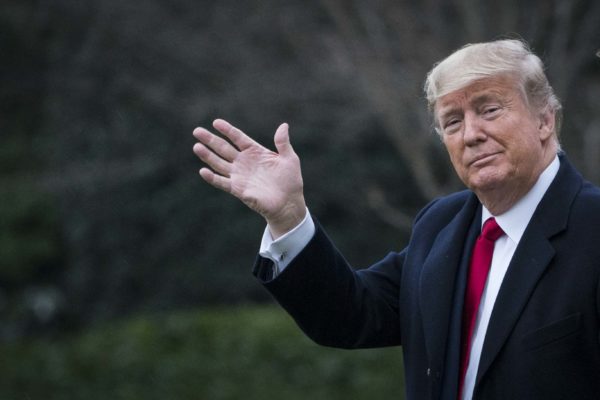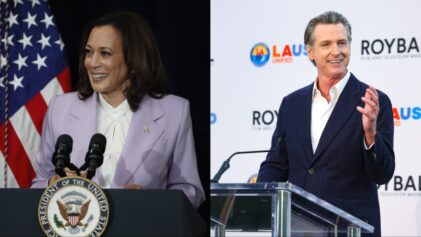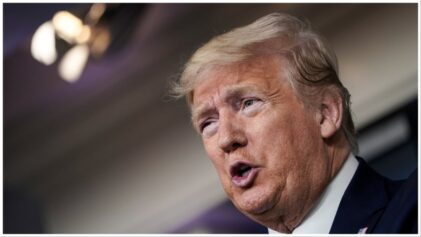President Donald Trump on Friday issued an expanded version of his travel ban targeting thousands of prospective immigrants from Nigeria, Africa’s largest economy, and five other foreign nations.
In addition to Nigeria, the new policy imposes restrictions on immigrant visas for citizens of Eritrea, Kyrgyzstan, Myanmar, Sudan and Tanzania, Reuters reported. The move is expected to impact thousands looking to come to the United States, as it nearly doubles the number of nations restricted by some form of a travel ban.

President Donald Trump expanded his controversial travel ban Friday to include six more countries, most of which are African. (Photo by Sarah Silbiger/Getty Images)
Trump’s original 2017 ban targeted six Muslim-majority countries, sparking outrage. Now the president seems to have focused his efforts on curbing immigration from the African continent; of the six nations added to the list, four are African countries: Nigeria, Eritrea, Sudan and Tanzania.
Nigeria boasts the largest population of any African nation and is expected to be the hardest hit by the ban. Vox reported that in 2018, the U.S. granted Nigerians an estimated 14,000 green cards and 222,000 temporary visas. Nigerians also account for the largest population of Africans living in the States.
In a phone call with reporters last week, acting U.S Homeland Security Secretary Chad Wolf explained that the six newly added nations failed to comply with U.S. security and information-sharing standards, prompting the new restrictions. Wolf cited “sub-par passport technology and a failure to sufficiently exchange information on terrorism suspects and criminals,” according to Reuters.
News of Nigeria’s inclusion in the controversial ban prompted a flurry of reactions from U.S. politicians, diplomats, policy experts and the like who criticized the move as discriminatory and xenophobic.
Atiku Abubakar, former vice president of Nigeria, said the decision was very disheartening.
“I received with sadness the policy of the government of the United States of America to place @Nigeria on its travel ban list,” Abubakar tweeted. “While I understand the reasons given by the Trump administration (the failure of the @MBuhari led administration to share information [and] address issues of terrorism, the ban doesn’t take into account the pro-American sentiments of the Nigerian public … and the solidarity previous Nigerian administrations have had with the United States. ”
Several others shared in his dismay, including Democratic California Sen. Kamala Harris. In a tweet, she smeared the move as wholly “un-American,” adding: “It’s clearly driven by hate, not security.”
https://twitter.com/imillhiser/status/1223366329526300672?s=20
“The only explanation for adding Nigeria to the travel ban is an act of racial control,” New York Times columnist Jamelle Bouie agreed.
Nana Gyamfi, executive director for the Black Alliance for Just Immigration, addressed the policy in a strongly worded statement, dubbing it yet another “manifestation [of] this administration’s racist agenda against Black people travelling to and living in the U.S.”
Calling out Trump’s previous asylum ban, Gyamfi said she isn’t surprised that “44 1/2, who described Nigeria and other African nations as ‘shit hole’ countries, is hell bent on intensifying his administration’s racist and xenophobic immigration policies targeting Black people.”
Yemi Koyejo of the Nigerian American Multicultural Council in Houston, Texas, told Boston’s WBUR that the ban will ultimately lead to losses for the U.S. and will have a negative impact on business dealings between Nigeria and the U.S.
“These bans will reduce the kind of talent that will show up in the U.S., because once things start getting too difficult … people will look for other options and there are options all over the world,” she added.
Trump teased the expansion of his travel ban during the World Economic Forum in Davos, Switzerland late last month and said the move was about keeping Americans safe.
“We’re adding a couple of countries to it,” he said. “You see what’s going on in the world. Our country has to be safe. So we have a very strong travel ban, and we’ll be adding a few countries to it.”
Under the new policy, nationals of Eritrea, Kyrgyzstan, Myanmar and Nigeria will no longer be able to apply for visas to immigrate to the U.S. permanently, according to a presidential decree. Additionally, the U.S. will stop those from Tanzania and Sudan from moving to the United States through the diversity visa lottery, which grants green cards to some 50,000 each year.
Those who’ve already been issued visas will not be affected.
The travel ban is expected to go into effect Feb. 21.


